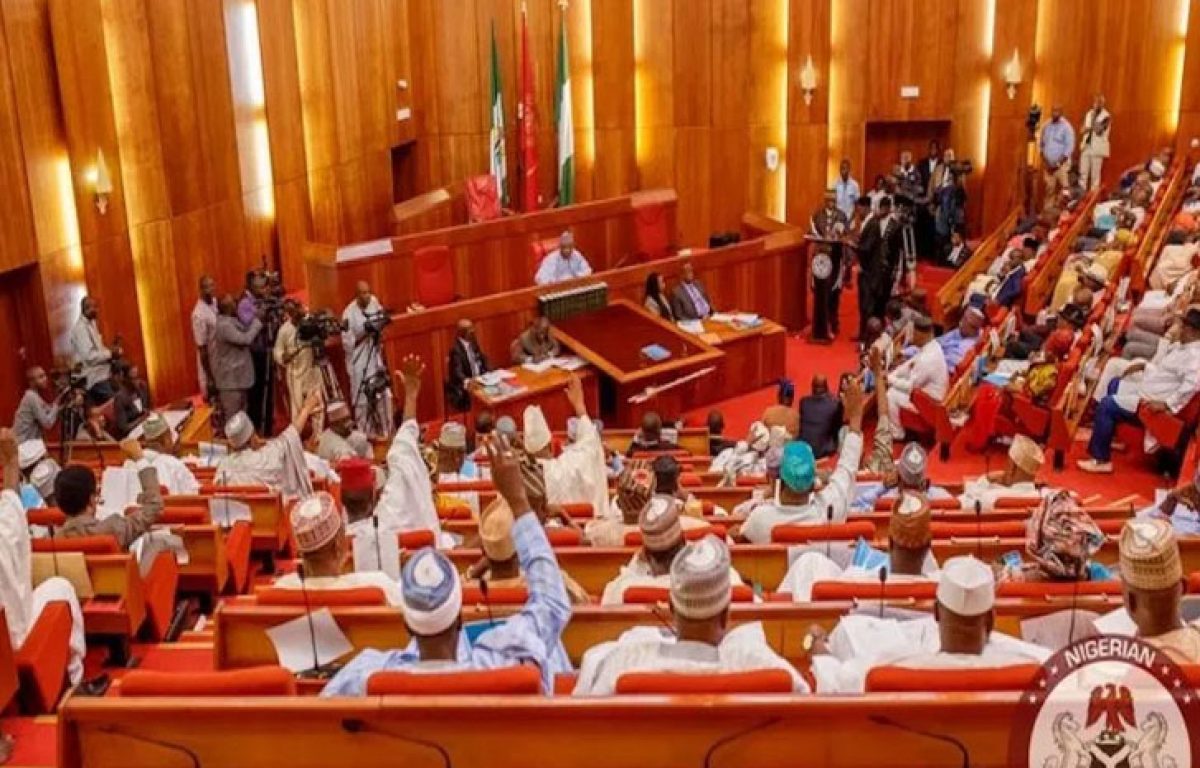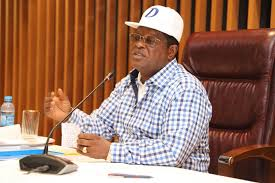Business
NDIC to Re-Arrest for Prosecution Absconded Bank Offenders
By Joseph INOKOTONG
The Nigeria Deposit Insurance Corporation (NDIC), said the Task Force on the Implementation of the Failed Bank Act has given notice to re-arrest for prosecution, directors and officers of licensed banks who had committed banking malpractices and had absconded.
A statement signed by B. A. Taribo, Director of Legal Department, NDIC, and
Chairman of the Task Force on Implementation of Failed Banks Act said “at its 38th meeting held on 13th March, 2017, some pending investigations were reviewed by the Police Financial Malpractices investigation Unit (FMIU) under the Failed Banks Act comprising seventeen (17) cases involving ten (10) closed Microfinance Banks [MFBs] in which fifteen (15) former Directors of the MFBs were involved.
“It also reviewed two (2) cases of closed Deposit Money Banks [DMBs] involving their former Directors. One of the closed DMBs cases currently under prosecution was FRN vs. Prince Adekunle Adeyeba & Ors where the accused persons being erstwhile directors of the closed Gulf Bank of Nigeria Plc. were facing trial over banking malpractices involving N15.1 billion of depositors funds in that closed bank.”
The statement added that the Task Force also reviewed about sixteen (16) criminal cases being prosecuted under the Failed Banks Act in which prosecution had been stalled as a result of the fact that the accused persons in those cases had jumped bail and had absconded from the country in the heat of their investigation and prosecution, and the sureties that took them on bail had also disappeared.
The Task Force noted that some of those accused persons had sneaked back into the country in the hope that their prosecutions might have been terminated. It is against this backdrop that the Task Force gave the notice that such accused persons would be re-arrested and prosecuted to serve as a warning to other bank offenders, adding that the Task Force would leave no stone unturned to ensure that erring bank offenders were brought to book.
It would be recalled that the Failed Banks [Recovery of Debts] and Financial Malpractices in Banks Act 1994 [Failed Banks Act] was promulgated to recover debts owed to Failed Banks which had remained outstanding as at the date the banks were closed or declared failed and to prosecute directors and officers of licensed banks who had committed banking malpractices.
In July 1995, the Inspector General of Police established a special Police Unit called the Failed Banks Inquiry to assist the NDIC and the Central Bank of Nigeria implement the criminal aspects of the Failed Banks Act through investigation of criminal complaints referred to the Unit by the Regulatory Authorities.
On the 28th of December 1998, the Attorney General of the Federation and Minister of Justice constituted the Task Force on Implementation of the Failed Banks Act.
The objective of the Task Force was to co-ordinate the different agencies involved in implementation of the criminal aspects of the Failed Banks Act in order to achieve heightened police investigation and legal officers/ private legal practitioners’ prosecution of suspects under the Failed Banks Act.
The members of the Task Force comprised the NDIC as Chairman, the Federal Ministry of Justice represented by the Director of Public Prosecution of the Federation, the Central Bank of Nigeria, the Failed Banks Inquiry [ now Financial Malpractices Investigation Unit], the Special Fraud Unit of the Police and subsequently, the Economic and Financial Crimes Commission.
In carrying out its objective, the Task Force reviewed the police investigation of suspects and the prosecution of accused persons by state counsel and private legal practitioners issued with the Fiat of the Attorney General of the Federation under the Failed Banks Act.
“Generally, the mandate of the Task Force was to superintend over the investigation and prosecution of failed bank cases from commencement of police investigation to ensure early arraignment of suspects before the Tribunals,” the statement further stated.
Business
Senate Committee Commends Tinubu on Launch of National Halal Economy Strategy to Tap $7.7trn Global Market*

The Senate Committee on Finance has commended President Bola Ahmed Tinubu for launching Nigeria’s National Halal Economy Strategy, describing it as a bold and strategic move to position the country within the lucrative global halal market, estimated at $7.7 trillion.
In a statement signed by its Chairman, the committee praised the initiative as timely and aligned with international best practices. Several countries—including the United Kingdom, Canada, Australia, Malaysia, Indonesia, Saudi Arabia, the United Arab Emirates, Turkey, Brazil, Thailand, and Singapore—have successfully used halal frameworks to boost manufacturing, agricultural exports, financial markets, and foreign investment.
The committee highlighted Nigeria’s strong advantages for success in this space, including its vast agricultural resources, large domestic market, youthful population, growing manufacturing sector, and expanding services industry.
It noted that the strategy fits seamlessly into the Tinubu administration’s broader economic reforms, such as boosting non-oil revenue, diversifying exports, creating jobs, supporting small and medium enterprises (SMEs), and increasing foreign exchange earnings.
President Tinubu, represented by Vice President Kashim Shettima, officially unveiled the strategy on Thursday, February 6, 2026, at the Presidential Villa in Abuja.
The framework, developed in collaboration with Saudi Arabia’s Halal Products Development Company (HPDC) following a bilateral agreement signed in February 2025 at the Makkah Halal Forum, aims to enhance quality standards, certification processes, and competitiveness across sectors like food, pharmaceuticals, cosmetics, tourism, and ethical finance.
The committee described the strategy as inclusive, market-driven, and globally oriented, while fully respecting Nigeria’s diverse and pluralistic society.
It is projected to contribute significantly to the economy, with estimates suggesting it could add around $1.5 billion to Nigeria’s GDP by 2027 and unlock billions more in domestic value over the coming decade through expanded exports and investment.
The Senate Committee on Finance pledged its full legislative support, oversight, and cooperation to ensure smooth implementation, regulatory clarity, and long-term fiscal sustainability in the national interest.
“This decisive step reinforces Nigeria’s readiness to adopt proven international models, unlock new economic frontiers, and establish itself as a competitive player in the evolving global economy,” the statement concluded.
Business
Ex-Naval Chief Named in ₦100m Property Transaction Dispute
A property transaction dispute has emerged involving Zoe New Dawn Nigeria Limited and a former Chief of Naval Staff, following claims by the company’s chairman, Engr. Dr. Stephen Achema Akpa, that a ₦100 million payment made for land was not followed by a transfer of ownership.

According to Akpa, the payment was made in connection with a land transaction reportedly facilitated by the former naval chief. He alleged that despite documented payments, the land in question was neither transferred to the company nor was the money refunded.
Akpa said Zoe New Dawn Nigeria Limited possesses transaction records and related documents which, he claims, support its position in the dispute. He added that the company has initiated steps to seek redress through appropriate legal channels.
The matter has drawn attention due to the profile of the parties involved, particularly against the backdrop of recurring disputes linked to land ownership and property transactions in Nigeria’s real estate sector.
Industry observers note that unresolved land transactions remain a common source of litigation, often arising from disagreements over title documentation, intermediaries, and contractual obligations.
Zoe New Dawn Nigeria Limited stated that it intends to pursue the matter through lawful means to determine liability and recover any funds deemed outstanding.
As of press time, no official response had been issued by the former Chief of Naval Staff regarding the allegations. The dispute has not yet been confirmed as the subject of any court proceedings.
Business
Umahi Inspects Lekki Corridor’s 7th Axial Road Project, Expresses Confidence in CHEC

Minister of Works Senator Dave Umahi over the weekend inspected the progress of the 7th Axial Road project in the Lekki Corridor of Lagos.
The project, located behind the Dangote Refinery, is a crucial cargo handling route for the Lekki Deepwater Port and connects the Lekki Corridor with the Sagamu route.
The Minister expressed confidence in China Harbour Engineering Company Limited (CHEC), the project’s contractor, citing its successful delivery of the Lekki Deepwater Port and high-quality progress on the Makurdi-Enugu road reconstruction and expansion project. Umahi instructed that the roadbed filling work for Project LOT1 be completed by the end of April and directed the project team to accelerate resource input and tangible works to meet the deadline.
The 7th Axial Highway is expected to synergize with key infrastructure projects like the Coastal Road, Dangote Road, and Lekki Port, creating a comprehensive transportation hub model and boosting Nigeria’s port economy and industrial corridor. Umahi emphasized the need for environmental protection agencies to ensure efficient construction and steady progress while maintaining ecological safety.
A representative of CHEC who spoke during the inspection stated that the company would maintain a high level of resource input, implement the Minister’s directives, and coordinate safety, quality, and environmental protection to ensure the project’s timely and high-quality completion in other to unluck its port relief and regional economic benefits.
-

 Uncategorized5 years ago
Uncategorized5 years agoFG, states urged to harness flooding for ranching, others with technology – Agbaje
-

 Headlines10 years ago
Headlines10 years agoBreaking: EFCC seals Borno House of Assembly, as Hon members take to their heels
-

 News12 years ago
News12 years agoNigeria Security Operatives Stage Manhunt For Homosexual Perpetrator
-

 News9 years ago
News9 years agoHow 21-year-old Girl fled community over accusation of lesbianism
-

 News10 years ago
News10 years agoYobe Gov Moves Against Deputy
-

 Opinion7 years ago
Opinion7 years ago7 signs she has friend zoned you
-
Technology4 years ago
Online job placement company headhunts women
-

 Headlines10 years ago
Headlines10 years agoBorno Dep Gov Abducts Another Church Leader





